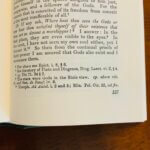I — rather literally — purloined that term — “The Odd Gods of the Galaxy” — from a commonwealth writer. Australia. Noted elsewhere. But when I was reviewing what I was going to post about Marcus Aurelius and his commentary about the face of god, I kept thinking I’d seen it differently in one of the older translations.
 Trying to remember, in one of the versions, I thought the quote was singular, but repeatedly, in two translations I tend to favor, plus a third, I found the quote to read “gods.”
Trying to remember, in one of the versions, I thought the quote was singular, but repeatedly, in two translations I tend to favor, plus a third, I found the quote to read “gods.”
Looked it up in the Loeb Classical version, which is a handy Greek/English side-by-side version, one of the reasons I got that copy, despite the possibly archaic language with its centuries-old grammar, but in this situation, quoting a martial politician patrician ruler who is almost 2,000 years old? I’ll forgive the dated “modern” language that reeks of King James in terms of style and usage.
The Odd Gods of the Galaxy
My original introduction is buried in a time and space, but the ideas are sound. Then, too, this is about the words themselves, and I wondered if Marcus Aurelius wrote in Greek or Latin. I would think, Latin being his original tongue, it would probably be that, first. The Greek is a later notion that it was more “academic.”
 I’ve lost touch with any pretense of being able to read the Greek, so that portion of the text, I can’t say, either way, if it is “god,” or “gods.”1
I’ve lost touch with any pretense of being able to read the Greek, so that portion of the text, I can’t say, either way, if it is “god,” or “gods.”1
Which launched a search engine mission for Latin Marcus Aurelius. Not using the behemoth, though because Google doesn’t know everything.
What I found was a citation by a former University of Texas professor, suggesting that Greek was used because it was the original language for philosophical points, and the Ancient Greek language had grammar better attuned to the ideas.
The Odd Gods of the Galaxy
So a quick answer to an un-asked question, as to why it was Greek, and that it was original.
However, that never answered the question of whether it was originally “god” or “gods.”2
One reason my pagan self likes Marcus Aurelius as a source? He’s acceptable to both devout Xtian and Pagan alike. Both sides embrace him, but I wonder, and since I don’t read the Greek? I can’t tell if that quote was singular or plural.
Given time and place? Probably plural as that was the existing beliefs. There was, and I can’t provide a source for the data, so I can’t say, but there was a suggestion Marcus Aurelius was on the cusp of Pagan and Christian Rome.
I like that old-time religion.
